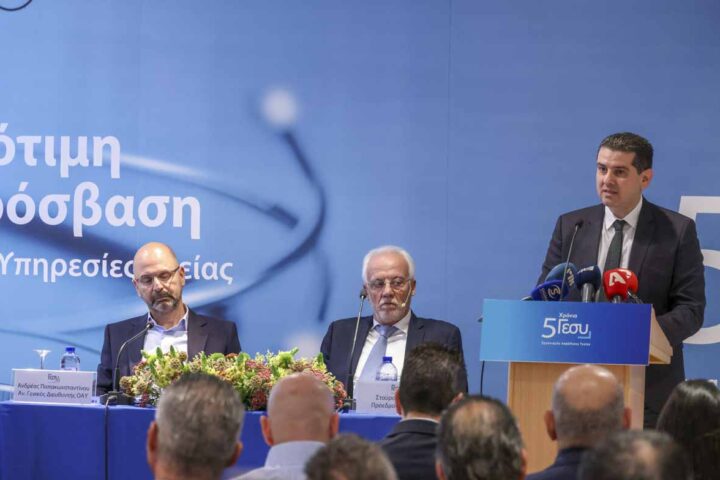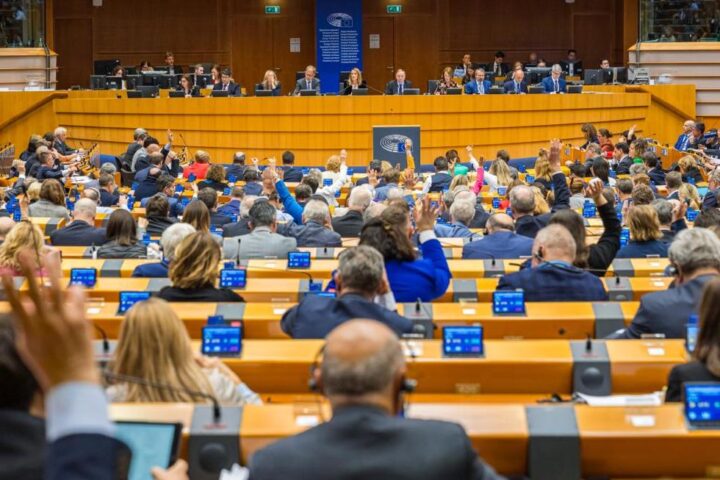Cyprus President Tassos Papadopoulos has praised the economic growth in Cyprus, saying that stability has been achieved through a carefully balanced plan, long strategy and the contribution of the social partners, who displayed self restraint in their demands.
He also said that the introduction of the euro, expected in January 2008, will not restrict economic development but on the contrary it will secure the stability of the currency and low interest rates and protect the economy from inflation.
Speaking at the opening of the 32nd Cyprus State Fair in
He said that the government has no intention of sacrificing the social state for the sake of entry into the eurozone, but noted also that all indications are that
“What we have achieved so far in economic terms is the result of concerted efforts by the employees, the employers and the government,†he said and extended sincere thanks for this to the trade unions and all concerned.
There is full employment, with unemployment rates at 4,5 per cent in 2006, per capita income at 86 per cent of the average in
“Inflation continues to remain at a low rate, around 2 per cent, interest rates have recorded their lowest level since the Republic was established in 1960, fiscal deficit dropped from 6,3 per cent in 2003 to 1,5 per cent of the GDP in 2006 and public debt is decreasing and stands at 65 per cent and continues to drop,†Papadopoulos said.
He also said that all this was achieved without any new taxes, on the contrary social grants and allowances now cover more people than before.
“Public finances are on a stability course and this is due to the people of
He noted that EU projections about the local economy are fully in line with the forecast of the Finance Ministry, adding that the government is well aware of public concern about the introduction of the euro and is taking all necessary measures to either minimize or eliminate them.
On direct trade between the Turkish occupied areas of
“Total exports from the Turkish occupied part of
He explained that the fact that the EU directive for financial aid to the Turkish Cypriots has been separated from moves to introduce direct trade certainly contribute to the economic development of the Turkish Cypriot community.
He sent a particularly warm welcome to Turkish Cypriot businessmen participating in the annual trade fair and expressed hope that their participation and the implementation of the Green Line regulation, relating to trade within the island, will contribute significantly to increased trade and financial transactions between the two communities and to conditions that will help reunite the country, divided since 1974 when Turkish troops invaded and occupied its northern third.
On
What Are Cookies
As is common practice with almost all professional websites, our site uses cookies, which are tiny files that are downloaded to your device, to improve your experience.
This document describes what information they gather, how we use it and why we sometimes need to store these cookies. We will also share how you can prevent these cookies from being stored however this may downgrade or ‘break’ certain elements of the sites functionality.
How We Use Cookies
We use cookies for a variety of reasons detailed below. Unfortunately, in most cases there are no industry standard options for disabling cookies without completely disabling the functionality and features they add to the site. It is recommended that you leave on all cookies if you are not sure whether you need them or not, in case they are used to provide a service that you use.
The types of cookies used on this website can be classified into one of three categories:
- Strictly Necessary Cookies. These are essential in order to enable you to use certain features of the website, such as submitting forms on the website.
- Functionality Cookies.These are used to allow the website to remember choices you make (such as your language) and provide enhanced features to improve your web experience.
- Analytical / Navigation Cookies. These cookies enable the site to function correctly and are used to gather information about how visitors use the site. This information is used to compile reports and help us to improve the site. Cookies gather information in anonymous form, including the number of visitors to the site, where visitors came from and the pages they viewed.
Disabling Cookies
You can prevent the setting of cookies by adjusting the settings on your browser (see your browser’s “Help” option on how to do this). Be aware that disabling cookies may affect the functionality of this and many other websites that you visit. Therefore, it is recommended that you do not disable cookies.
Third Party Cookies
In some special cases we also use cookies provided by trusted third parties. Our site uses [Google Analytics] which is one of the most widespread and trusted analytics solutions on the web for helping us to understand how you use the site and ways that we can improve your experience. These cookies may track things such as how long you spend on the site and the pages that you visit so that we can continue to produce engaging content. For more information on Google Analytics cookies, see the official Google Analytics page.
Google Analytics
Google Analytics is Google’s analytics tool that helps our website to understand how visitors engage with their properties. It may use a set of cookies to collect information and report website usage statistics without personally identifying individual visitors to Google. The main cookie used by Google Analytics is the ‘__ga’ cookie.
In addition to reporting website usage statistics, Google Analytics can also be used, together with some of the advertising cookies, to help show more relevant ads on Google properties (like Google Search) and across the web and to measure interactions with the ads Google shows.
Learn more about Analytics cookies and privacy information.
Use of IP Addresses. An IP address is a numeric code that identifies your device on the Internet. We might use your IP address and browser type to help analyze usage patterns and diagnose problems on this website and to improve the service we offer to you. But without additional information your IP address does not identify you as an individual.
Your Choice. When you accessed this website, our cookies were sent to your web browser and stored on your device. By using our website, you agree to the use of cookies and similar technologies.
More Information
Hopefully the above information has clarified things for you. As it was previously mentioned, if you are not sure whether you want to allow the cookies or not, it is usually safer to leave cookies enabled in case it interacts with one of the features you use on our site. However, if you are still looking for more information, then feel free to contact us via email at [email protected]







